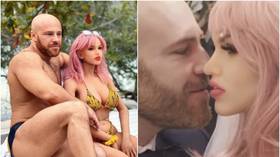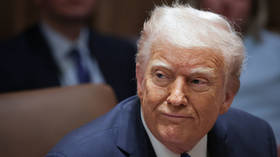Walkouts and wokeness: Champions League scenes show sport is hostage to social justice campaigns – and fans will suffer
The Champions League walkout by Paris Saint-Germain and Istanbul Basaksehir proves sport is increasingly at the mercy of any and every whiff of social injustice. But there is no end game, and fans will be the ones missing out.
Tuesday night's match in Paris lasted all of 14 minutes before the players and coaching staff stormed off to the changing rooms, not to return.
The scenes were unprecedented in Europe's premier club competition, and promptly gave rise to such apocalyptic headlines as 'Night of Shame' as fans and pundits piled in on 'racist' Romanian match official Sebastian Coltescu.
Coltescu’s crime? Supposedly referring to Basaksehir assistant coach Pierre Webo as 'the black guy' while identifying him so that he could be sanctioned for misbehavior on the bench.
As an incandescent Webo demanded to know why Coltsecu had called him a 'negro' (recordings suggest Coltescu or a fellow match official had actually used the phrase 'ala negru' – Romanian for 'the black one'), any efforts to defuse the tensions were futile.
Both sets of players and coaching staff were off down the tunnel, praise ringing in their ears for providing a 'watershed' moment for football in the face of outright 'racism' from the Romanian official.
But as the dust settles, football – and sport as a whole – would do well to ponder what exactly the end game is in all of this, when offence for perceived slights from fringe members of proceedings causes far broader disruption.
Cancelling matches, putting tournaments on hold, potentially scrapping entire seasons – this is the new normal for sports fans as events are ever more subject to the whims of social justice campaigns.
Tuesday's scenes followed the chastisement of fans in England for booing players who were taking a knee – a frankly unsurprising development considering how keen football was to jump on the Black Lives Matter bandwagon, with scant thought given to the consequences.
In light of that row, and with fans essentially being told to 'shut up' if they had an issue with players kneeling, it's not implausible to suggest that matches could be cancelled before they've even got going – making the 14 minutes played in Tuesday's game in Paris seem lengthy in comparison.
Away from football, earlier this year Japanese tennis star Naomi Osaka withdrew from the Western and Southern Open in New York in protest after Jacob Blake, a black man, was shot by police.
Pandering to Osaka, and itching to signal their own virtues, organizers put the entire tournament on hold, only for Osaka to reverse course and play her semi-final after all.
Over in the NBA, so often held up as a gleaming paragon for sport's social justice campaigns, players discussed boycotting this year's play-offs entirely in protest over Blake's shooting – a gesture which would somehow help stop police brutality.
Also on rt.com By showcasing their wokeness and pandering to Naomi Osaka’s one-woman strike, tennis bosses have set a dangerous precedentThe crusaders for justice and equality will assert that these disruptions to sport are a small price to pay; indeed, the reaction from fans online showed widespread support for Basaksehir and PSG for their stance.
But it's easy to ride a tide of anger (much of which is often manufactured), and far harder to ask what comes next.
Completely cleansing sport of derogatory remarks – be they racist, homophobic, misogynistic, or even comments such as Coltescu's on Tuesday night – might be a laudable aim, but it's also an unrealistic one.
Equally, it is misguided to allow social justice causes to be hitched to sporting events when and where competitors feel like it, regardless of the consequences to fans – many of whom find the causes less than pertinent, even if protests are supposedly carried out in their name.
The return of large crowds to football stadiums will only throw up more questions in what is already a markedly different landscape to the one before the Covid lockdown.
What if the odd idiot among 50,000 fans casts a remark far more offensive than Coltescu’s? Based on Tuesday's evidence, it seems we are willing to readily sacrifice matches. The players walk, while everyone else trudges off home or turns off the TV.
The counter argument will be that, given his position, Coltescu should have picked his words more carefully. That's true, but it's also a stretch to argue that he's the dyed-in the-wool racist that many are now making him out to be.
Indeed, where do we draw the line? Football crowds chant about anything and everything, from overweight players to stereotypes about rival teams. Removing the more obvious racist bile seems easier, but how far do you go? Is potentially misheard abuse enough to halt a game? Is an individual athlete's stance about a particular political or social cause enough to bring down entire events?
On current form, this is the direction we're heading, especially if those causes align with the broader social justice topics which happen to be flavor of the month among liberal society.
It's worth noting that the uproar in Paris played out in front of empty stands at the Parc des Princes – a reminder that fans in some parts of the world continue to be starved of live sport during a year in which social protests of all stripes have gone ahead regardless.
The specter of Covid-19 still hovers malevolently, but just as things are returning to some semblance of normality, fans now find themselves confronted with doubts over whether clumsy language, booing, or the social justice causes of particular individuals could yet deprive them of even more sport.
What, ultimately, are the lengths we are willing to go to in order to reprimand people such as Coltescu, who used a term which has been seized upon as a racial slur, but which has also been defended as merely a descriptive term in his native tongue?
Consequences which may once have seemed far-fetched are no longer so implausible in the current climate of sport's proclivity for grandstanding, and the all-out arms race developing to prove 'who cares more' about social justice buzzwords.
There was novelty intermingled with anger over Tuesday's scenes in France – but that novelty will soon wear off if fans have to witness walkouts and wokeness at any and every opportunity.
By Liam Tyler














